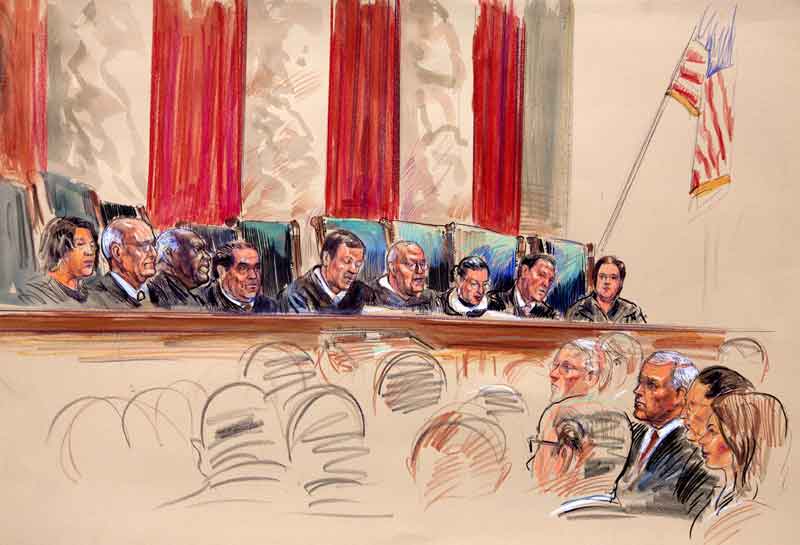When the Supreme Court affirmed the Affordable Care Act, some conservatives argued that they won an important legal argument, even while losing the case. That victory will bear no fruit, however, until conservatives persuade the American people to embrace their constitutional vision.
According to the original design of the Constitution, the national government may act only in areas where it has been granted power to act. The theory and practice of limiting the national government to the exercise of its granted powers prevailed for almost 150 years.
During that entire period, the Supreme Court certainly would have struck down the Affordable Care Act as an exercise of powers not granted to Congress.
During the Depression, however, demands grew for the national government to take a more active role in the economy, but the Constitution limited what Congress could do. It grants the power to regulate commerce among the states, but that meant that Congress had power to specify how traffic and trade across state lines could be conducted (because that is what interstate commerce means).
Congress had no power to regulate wages and working conditions on farms and in factories, because they engage in manufacturing not commerce. Farms and factories were supposed to be regulated by the governments of the states in which they were located.
Franklin Delano Roosevelt’s New Dealers argued that this division of authority between the states and the national government made no sense. They believed that laws to raise wages, limit working hours and to establish higher prices for farm products would help end the Depression.
Any state government that wanted to implement these policies faced a problem, however: States that raised the costs of doing business would only drive business to other, less-regulated states. So, to get around this problem (which they called the problem of “unfair competition”), they “interpreted” the power to regulate commerce among the states to mean the power to regulate any economic activity that substantially affects interstate commerce — which turns out to be pretty much every kind of economic activity.
Flash forward to the Affordable Care Act, which mandates that individuals have health insurance or pay money to the government. Today’s Democrats make the same argument as their New Deal predecessors to justify expanding the powers of the national government: The lack of health insurance is a national problem, they insist, needing a national solution. People who don’t have health insurance but then get free care when they show up at hospitals impose costs on others, and these costs substantially affect interstate commerce.
A majority of the Supreme Court rejected that argument. Five justices agreed that this argument went beyond even what the New Deal courts had permitted: To uphold the requirement that people buy health insurance as a regulation of commerce, they held, was to permit the Congress to create commerce in order to regulate it, which would give Congress an unlimited power to mandate any sort of activity. If the Congress can make us buy health insurance today, what affirmative activity can it not require?
As an aside, note that the small victory conservatives cheered in the ruling was the fact that five justices would not depart further from the original understanding of the Constitution than the Supreme Court that had embraced the New Deal.
Chief Justice John Roberts agreed with that logic, but voted to uphold the law anyway. Though no other justice or judge accepted this argument, he held that the Affordable Care Act was a valid exercise of Congress’ power to tax.
The real “mandate” in the law, he found, is the requirement to pay the government if one does not have health insurance — and such a required payment is, Roberts held, constitutionally a tax. Only Roberts knows for sure why he voted as he did, but he seems to have concluded that striking down the law would have appeared partisan, rather than principled. Hence his embrace of the novel, and widely rejected, tax theory.
It may be true, as Justice Anthony Kennedy wrote in dissent, that “the fragmentation of power produced by the structure of our government is central to liberty” but that general sentiment is not likely to persuade many voters that allowing Congress to wield powers that once belonged exclusively to the states amounts to a matter of fundamental principle.
Rather than condemn Roberts for going wobbly, conservatives need to work harder to make their case so that the next time Washington oversteps its power, the Supreme Court will be have the confidence to make a principled stand for liberty.
Joseph R. Reisert is associate professor of American constitutional law and chairman of the department of government at Colby College in Waterville.
Send questions/comments to the editors.



Success. Please wait for the page to reload. If the page does not reload within 5 seconds, please refresh the page.
Enter your email and password to access comments.
Hi, to comment on stories you must . This profile is in addition to your subscription and website login.
Already have a commenting profile? .
Invalid username/password.
Please check your email to confirm and complete your registration.
Only subscribers are eligible to post comments. Please subscribe or login first for digital access. Here’s why.
Use the form below to reset your password. When you've submitted your account email, we will send an email with a reset code.